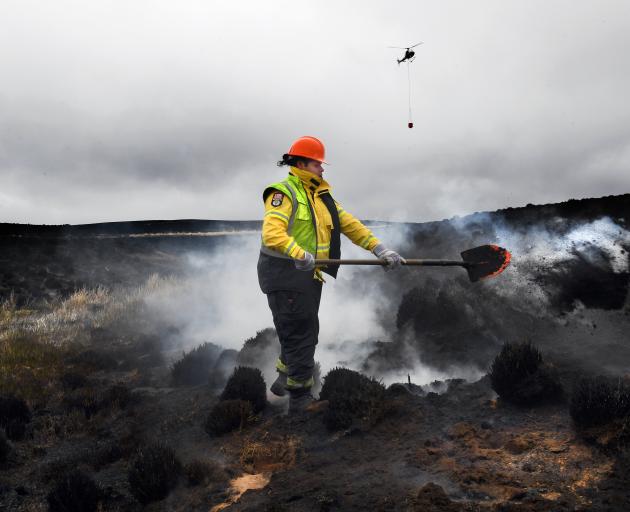Here at last is that Opinion article by Maurice Prendergast.
I hope the ODT don't throw a hissy about the whole article being copied to this blog. I couldn't find any parts to cut out, and anyway it is such important knowledge that it needs to be available in many places to remind people there was a time before smart-everything technology, a time when people had to be smart with their own brains, hands and memory of what worked ever since way back when.
Tuesday, 3 December 2019
Fire-prone circumstances created decades ago

Forestry
worker and firefighter Thijs Aisi turns over smouldering ground on the
Te Papanui conservation park fire last month. Photo: Stephen Jaquiery
Why do I say manic? Because it was an exercise in idealism driven by misguided personnel who had never had to fight a mountain fire, or who had never witnessed the absolute desolation and the consequential loss by summer fire (forever) of precious water-capturing vegetation.
‘‘Embrace this puerile proposal and the city will one day have no water’’ was my plaintive plea in opposition to the proposal to buy the city’s water catchment, destock it, allow the consequential over-growth of the snow grasses to the (maybe) height of a man on a horse ... and with the litter thus generated to fuel it, there will be a holocaust of a magnitude that no man has ever before witnessed.
And if it’s a hot summer fire (I postulated) it will burn to the roots of the vegetation. And there will be no water in Dunedin; forever! Why did I consider myself fit to make such a prediction?
Though I am uneducated in an academic sense, I am a son of the soil. For 30 years I farmed the challenging and snow-clad heights of the Rock and Pillar Ranges.
Against the theoretically driven hysteria of the ‘‘green fraternity’’, we guarded against the risk of a devastating summer fire by having management spring fires, and against all academic advice, we’d burn on a windy day, when the root system of all vegetation still had wet feet and would thus be unchallenged.
The purpose of this practice was twofold. One was that a quick fire only took the top off the snow grass, and it was this ‘‘top’’ that (if left unchanged) would become the ‘‘floor litter’’ that would fuel a summer fire.
And secondly, with the green shoots of the regrowth and the absence of any litter on the floor, there was nothing to ignite or fuel a summer fire that would threaten the life of the vegetation so critical in its purpose to retain and slowly release precipitation of any form.
We (the guardians of the land) learned by example. And the most enduring example of ‘‘what not to do’’ was presented to us on a sunny face where an accidental summer fire had occurred the year before we purchased that land (1965).
And as it avalanched it would have stripped from its rocky bed the meagre and precious soil that had taken millions of years to establish and delivered it to the mountain stream below.
That precious soil is now somewhere in the Pacific Ocean. I have not needed a Harvard education to have understood all this, and this is the hands-on experience that I attempted to bring to that council meeting’s proposal so many years ago.
But though Dunedin is a huge rural local authority of 3600sq km, it is presided over by a majority of urban councillors who had never had dirt under their fingernails.
And decisions are made on the basis of numerical might, rather than any sense of reason. And that day the security of the city’s water supply was vandalised. That recent fire is just an appetiser; the main course is yet to come. It gets worse!
The city has a tiger by the tail in the presence of its doubtful neighbour, the Department of Conservation, who contemporaneously wrested a huge slab of tussock land from Rocklands Station. This land lies adjacent to the (now owned) city water catchment.
In my day, before we went on to the tussock land in the summer season, everybody was made to put their cigarettes and matches in a bucket (or such vessel), and everybody smoked! That was an unwritten law, and how seriously we respected that country.
Now that that country’s guardianship is in the hands of Doc. They seem not to have engaged in any form of environmental care and just to rub salt to the wound, I’m told that recreation on that land is encouraged.
Can one imagine what a spark from a 2-stroke motorcycle might do to the city’s water supply? Can we have any confidence that Doc, who operate under the banner of conservation, is anything other than the rogue neighbour that the city council and its water catchment does not need?
■ Maurice Prendergast is former Dunedin city councillor and deputy mayor.
Joshua Wright-Smith The CSIRO in 2009 predicted a 65% increase in fire activity throughout the southeastern parts of Australia in 2020.
Karen Whitty Joshua
Wright-Smith of course... because they deliberately locked up the
national parks, stopped all burns/ clean ups , halved park rangers nsw
and effectively created the huge fuel load..... disgraceful


No comments:
Post a Comment
Comment here: